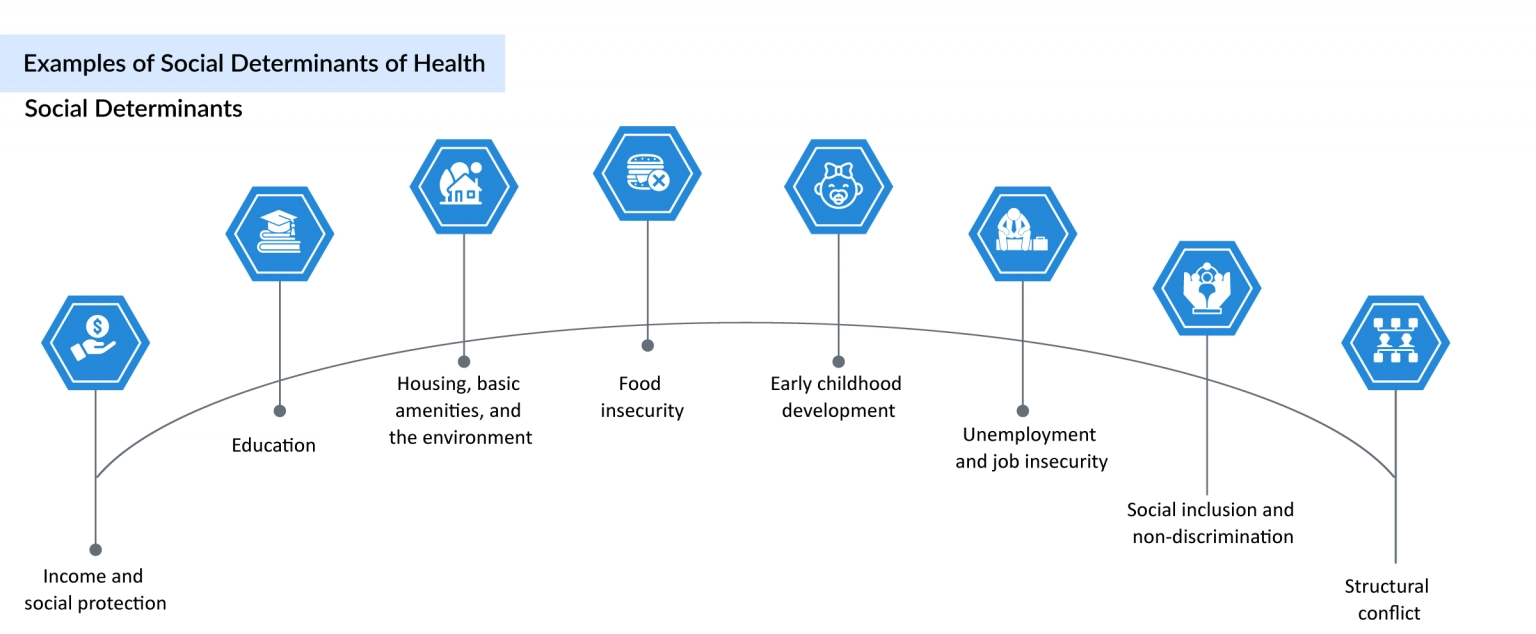Health is influenced by far more than the care people receive in clinics or hospitals. The social determinants of health capture these wider influences, including housing quality, income, education, employment, food access, healthcare availability, and social support. These conditions create either pathways to good health or barriers that lead to disease and shortened lifespans. For example, someone living in safe housing with access to nutritious food and stable income will likely enjoy better outcomes than someone struggling with unemployment, unsafe housing, and food insecurity. Such disparities prove that health cannot be separated from the environments in which people live their daily lives. The relevance of SDOH is clear when considering how these determinants compare with medical care. Health is shaped by five categories: genetics, behaviors, environmental conditions, social context, and access to care. These categories are deeply interconnected. For instance, a patient with a heart condition may receive excellent clinical care but still face complications if they live in a neighborhood without access to fresh foods or safe spaces for physical activity. Conversely, strong social support, education, and stable resources increase the chances of positive outcomes. Addressing social determinants therefore reduces preventable illnesses and improves overall health equity. The COVID-19 pandemic demonstrated this vividly. The social determinants of health model provided the framework to understand why some communities were hit harder. Low-income households often faced crowded living conditions, higher exposure as frontline workers, and limited access to healthcare. Many lacked the digital resources necessary for remote work or telehealth. These factors meant the virus spread faster and caused more harm in vulnerable populations, showing that pandemics are social as well as medical crises. Effective responses needed to target not just the disease itself but also the inequalities that worsened its impact. Pharmaceutical companies have started to adjust their role in response to these lessons. Instead of focusing solely on producing medications, they are now paying attention to the circumstances that prevent patients from accessing or adhering to treatment. Real-world data has shown that the types of social determinants of health such as income, transportation, and education have direct effects on health outcomes. Patients may stop treatment not out of choice but because of affordability challenges or lack of support in managing conditions. As a result, pharmaceutical companies are developing affordability programs, collaborating with community organizations, and creating patient education tools. While they cannot solve all social problems, their engagement is important in closing gaps that influence care. The future of healthcare depends on further integrating social and medical approaches. Many providers are beginning to screen patients for social risks and link them to local resources that can reduce preventable hospital visits. Insurers and governments are also recognizing the financial value of prevention, as healthier communities cost less to care for. This marks a shift from focusing only on treatment to emphasizing prevention, equity, and sustainable healthcare. Moving forward, collaboration among healthcare providers, policymakers, industries, and communities will be necessary to build environments where everyone can thrive. Ultimately, the social determinants of health are central to shaping outcomes. The pandemic highlighted their importance, showing that inequities in housing, income, and access create vulnerabilities that worsen crises. The pharmaceutical industry’s involvement shows that solutions require more than medical innovation alone. By addressing both clinical care and the social conditions that define health, society can move closer to equity and build a healthcare system that supports all people, regardless of background, in achieving healthier and longer lives.
Latest Reports Offered by Delveinsight:
Holter Monitor Market | Bulimia Nervosa Market | Decompensated Cirrhosis Market | Elastomeric Pump Market | Microscopy Device Market | Temporomandibular Disorders Market | Fetal And Neonatal Monitoring Devices Market | Benign Prostatic Hyperplasia Market | India Healthcare Report | Metrorrhagia/dysfunctional Uterine Bleeding Market | Transdermal Drug Delivery Devices | Drug Hypersensitivity Market | Energy Based Aesthetic Devices Market | Fap Inhibitor Market | Liquid Biospy For Cancer Diagnostics Market | Tendonitis Market | Transcatheter Treatment Market | Antibody Drug Conjugate Market | Bone Neoplasms Market | Bronchiolitis Obliterans Syndrome Bos Market
About DelveInsight
DelveInsight is a trusted provider of life sciences and pharmaceutical market research and consulting, offering actionable insights that empower organizations to make informed decisions. With a commitment to delivering strategic intelligence, DelveInsight serves as a key partner to global pharmaceutical, biotechnology, and healthcare companies looking to excel in an evolving market landscape.
Contact Us
Kanishk
Email: [email protected]




